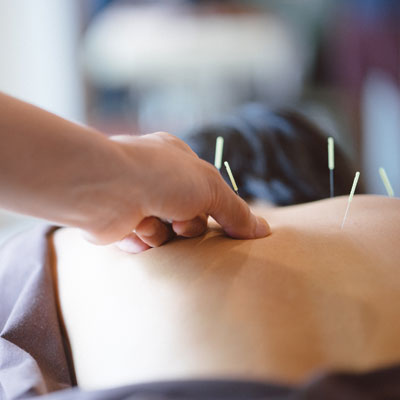Acupuncture in Barrie
 Contemporary medical acupuncture is a therapeutic procedure in which fine solid needles are inserted into specific sites of the body where the nervous system is particularly active (neuro-reactive sites). This is done to stimulate various therapeutic responses from the nervous system, including a release of neuropeptides (your body’s “feel good” chemicals), relaxation of tight muscles, increased blood flow, improved muscle activation, and other beneficial changes. The treatment protocol used is specifically individualized for each patient, and is designed based on a thorough examination and the patient’s therapeutic goals.
Contemporary medical acupuncture is a therapeutic procedure in which fine solid needles are inserted into specific sites of the body where the nervous system is particularly active (neuro-reactive sites). This is done to stimulate various therapeutic responses from the nervous system, including a release of neuropeptides (your body’s “feel good” chemicals), relaxation of tight muscles, increased blood flow, improved muscle activation, and other beneficial changes. The treatment protocol used is specifically individualized for each patient, and is designed based on a thorough examination and the patient’s therapeutic goals.
Research has shown that pain is very complex and personal. The condition of our muscles, joints, and other tissues can’t always fully explain the way we feel, as it is often influenced by a combination of dysfunctions, sensory signals, and complex emotions, particularly with chronic pain.
NEW PATIENTS
Using a modern neurofunctional approach to pain allows your doctor to take both your peripheral nervous system (the area that hurts) and the central nervous system (how your brain processes the issue) into account. In chronic pain, the nervous system can overreact and misinterpret normal sensation because it is hyper-aware of the area. This results in inappropriate pain where there is no actual tissue damage or threat. Since acupuncture addresses pain both centrally and peripherally, it can often relieve stubborn pain that could not be addressed with other approaches.
Contemporary medical acupuncture works well as a standalone modality, but is often used with other forms of treatment.
On the other hand, Traditional Chinese Medicine Acupuncture, uses acupuncture therapy to help restore to flow of energy (Chi) that is thought to flow along the bodies meridian lines. Both forms of acupuncture have shown to provide significant health benefits.
Frequently Asked Questions
The bottom line is that while acupuncture can cause some different sensations, it shouldn’t hurt. If it does, let your acupuncturist know right away so the needles can be adjusted into the skin.
How many sessions are needed for acupuncture to be effective?
Can I receive acupuncture when I am pregnant?
Conditions That Respond Well To Acupuncture
- Tension Headaches
- Migraine Headaches
- TMJ/Jaw Pain
- Neck Pain
- Whiplash
- Shoulder Pain
- Tennis Elbow
- Golfers Elbow
- Carpel Tunnel
- Mid Back Pain
- Rib Pain
- Low Back Pain
- Disc Herniations
- Sacroiliac Pain
- Sciatica
- Achilles Tendonitis
- Plantar Fasciitis
- Metatarsalgia
- Joint Sprains
- Muscle Strains
- Tendonitis
- Arthritis
- Overuse injuries
- Chronic Pain
To find out how you can benefit from medical acupuncture, contact us today.
CONTACT US

